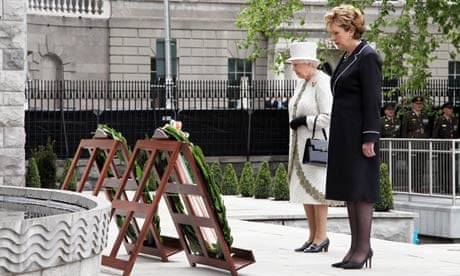On Tuesday morning I attended a commemoration in Dublin, to mark the anniversary of a series of bomb attacks on Dublin and Monaghan on 17 May 1974, which left 34 people dead. It was the worst atrocity during the decades of conflict.
The event was organised by families and survivors who believe, along with many others, that there was collusion in this attack between the Ulster Volunteer Force and British security agencies. A committee of the Dáil – the Irish parliament – which examined this and other cases concluded: "We are dealing with acts of international terrorism that were colluded in by the British security forces." And three years ago a unanimous motion was agreed, asking the British government to release all documents relating to this incident. The British government refused.
On the day that Queen Elizabeth arrived in this part of Ireland, the families asked that the British government release the files. The refusal thus far to do this and the partition of Ireland, is evidence of the unequal relationship that has marked relations between Ireland and Britain. The visit has brought a renewed focus to this relationship.
I believe the visit of Queen Elizabeth is troubling for many Irish citizens, particularly victims of British rule and those with legacy issues. Sinn Féin wants to see a profoundly new and better relationship between the peoples of Ireland and Britain – one built on equality and mutual respect. I hope this visit will hasten that day, but much will depend on what the British monarch says. Her laying of a wreath at the Garden of Remembrance for those Irish men and women who died in the cause of Irish freedom from Britain, hints at the possibility of a new relationship.
As an Irish citizen who was detained without charge or trial a number of times on a British prison ship, in a prison camp and an H-Block, as well as a more conventional prison, at "Her Majesty's pleasure", I hope so. So too will many of the families of victims in the conflict, including victims of British terrorism and collusion.
However, the complete normalisation of the relationships within Ireland and between Ireland and Britain can only be fully achieved by ending partition and reuniting our people and the country.
British interference in Irish affairs has come at a huge cost to the Irish people. It has been marked by invasion, occupation, subjugation, famine and cycles of Irish resistance and British repression. The impact of this, including partition and its consequences, are still being felt.
Irish republicans, too, have caused much hurt to people in Britain. I regret this.
The peace process has transformed the political landscape in Ireland and resulted in a peaceful political dispensation based on an historic accord between Irish nationalism and unionism. The Good Friday agreement is the foundation upon which new relationships between unionists and nationalists, and between Ireland and Britain, can be forged. It has opened up a peaceful, democratic route to a united Ireland.
And because nationalists and unionists are governing the north, decisions affecting the lives of people there are being increasingly made in Ireland and not in Britain. Republicans want to continue and to accelerate this process.
The united Ireland that Sinn Féin seeks to build encompasses all the people of this island, including unionists. It will be a pluralist, egalitarian society in which citizens' rights are protected and in which everyone will be treated equally. Sinn Féin wants a New Republic. That, of course, is a matter for the people of this island to decide.
But no matter how we shape our society, the new Ireland must embrace our island's diversity in its fullest sense. This includes English and Scottish influences, the sense of Britishness felt by many unionists, as well as indigenous and traditional Irish culture and the cultures of people who have come to Ireland in recent times.
Ireland and England are not strangers to each other. We should build on what we have in common, while at the same time respecting each other's sovereignty and independence. Perhaps the visit by Queen Elizabeth will assist this process. I hope so.
